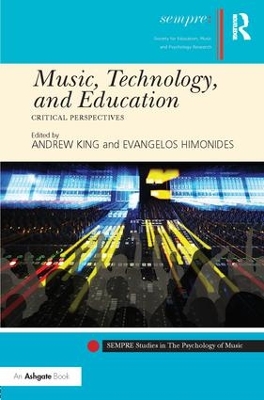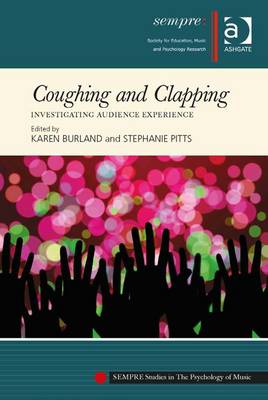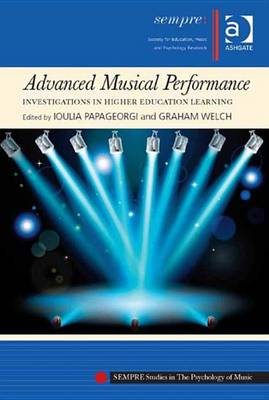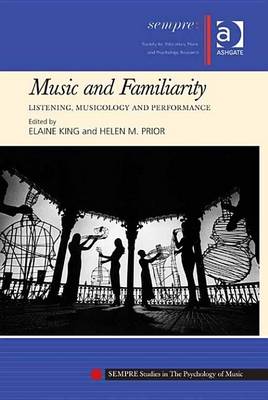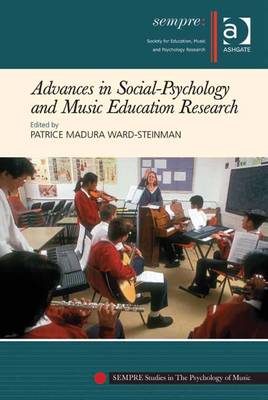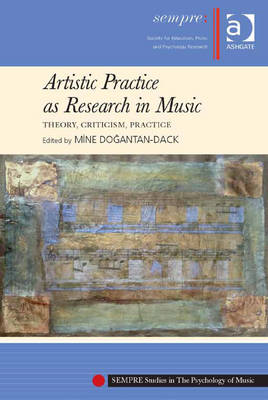SEMPRE Studies in The Psychology of Music
7 total works
Music, Technology, and Education
Every single day people come together to make music. Whether amateur or professional, young or old, jazz enthusiasts or rock stars, what is common to all of these musical groups is the potential to create `communities of musical practice' (CoMP). Such communities are created through practices: ways of engaging, rules, membership, roles, identities and learning that is both `shared' through collective musical endeavour and `situated' within certain sociocultural contexts. Ailbhe Kenny investigates CoMP as a rich model for community engagement, musical participation and transformation in music education.
The book provides a sustained, in-depth study of the social process of collective music-making that builds on and expands a `community of practice' framework. Employing case study research within Ireland, three illustrations from particular sociocultural, genre-specific, economic and geographical contexts are examined: an adult amateur jazz ensemble, a youth choir, and an online Irish traditional music tuition platform. Each case is analysed as a distinct community and phenomenon offering sharpened understandings of each sub-culture. In capturing the complexities that lie within musical communities, the importance of group music-making opportunities in people's lives is highlighted. Thus, the book presents an important window into the connection between community, learning and music.
Coughing and Clapping: Investigating Audience Experience
Coughing and Clapping: Investigating Audience Experience explores the processes and experiences of attending live music events from the initial decision to attend through to audience responses and memories of a performance after it has happened. The book brings together international researchers who consider the experience of being an audience member from a range of theoretical and empirical perspectives. Whether enjoying a drink at a jazz gig, tweeting at a pop concert or suppressing a cough at a classical recital, audience experience is affected by motivation, performance quality, social atmosphere and group and personal identity. Drawing on the implications of these experiences and attitudes, the authors consider the question of what makes an audience, and argue convincingly for the practical and academic value of that question.
Advanced Musical Performance: Investigations in Higher Education Learning
To reach the highest standards of instrumental performance, several years of sustained and focused learning are required. This requires perseverance, commitment and opportunities to learn and practise, often in a collective musical environment. This book brings together a wide range of enlightening current psychological and educational research to offer deeper insights into the mosaic of factors and related experiences that combine to nurture (and sometimes hinder) advanced musical performance. Each of the book's four sections focus on one aspect of music performance and learning: musics in higher education and beyond; musical journeys and educational reflections; performance learning; and developing expertise and professionalism. Although each chapter within its home section offers a particular focus, there is an underlying conception across all the book's contents of the achievability of advanced musical performance and of the important nurturing role that higher education can play, particularly if policy and practice are evidence-based and draw on the latest international research findings.
The narrative offers an insight into the world of advanced musicians, detailing their learning journeys and the processes involved in their quest for the development of expertise and professionalism. It is the first book of its kind to consider performance learning in higher education across a variety of musical genres, including classical, jazz, popular and folk musics.
The editors have invited an international community of leading scholars and performance practitioners to contribute to this publication, which draws on meticulous research and critical practice. This collection is an essential resource for all musicians, educators, researchers and policy makers who share our interest in promoting the development of advanced performance skills and professionalism.
Music and Familiarity
Familiarity underpins our engagement with music. This book highlights theoretical and empirical considerations about familiarity from three perspectives: listening, musicology and performance. Part I, `Listening', addresses familiarity as it relates to listeners' behaviour and responses to music, specifically in regulating our choice and exposure to music on a daily basis; how we get to know music through regular listening; how comfortable we feel in a Western concert environment; and music's efficacy as a pain-reliever. Part II, `Musicology' exposes the notion of familiarity from varied stances, including appreciation of music in our own and other cultures through ethnomusicology; exploration of the perception of sounds via music analysis; philosophical reflection on the efficiency of communication in musicology; evaluation of the impact of researchers' musical experiences on their work; and the influence of familiarity in music education. Part III, `Performance', focuses on the effects of familiarity in relation to different aspects of Western art and popular performance, including learning and memorizing music; examination of `groove' in popular performance; exploration of the role of familiarity in shaping socio-emotional behaviour between members of an ensemble; and consideration about the effects of the unique type of familiarity gained by musicians through the act of performance itself.
Advances in Social-Psychology and Music Education Research
This Festschrift honors the career of Charles P. Schmidt on the occasion of his retirement from the Indiana University Jacobs School of Music. His main research focus has been the social-psychology of music education, including the subtopics of motivation in music learning, applied music teaching behaviors, and personality and cognitive styles in music teaching and learning. The chapters in this volume recognize the influence of Schmidt as a researcher, a research reviewer, and a research mentor, and contribute to the advancement of the social-psychological model and to research standards in music education.
These themes are developed by a stunning cast of music education scholars, including Hal Abeles, Don Coffman, Mary Cohen, Robert Duke, Patricia Flowers, Donna Fox, Victor Fung, Joyce Gromko, Jere Humphreys, Estelle Jorgensen, Anthony Kemp, Barbara Lewis, Clifford Madsen, Lissa May, Peter Miksza, Rudolf Radocy, Joanne Rutkowski, Wendy Sims, Keith Thompson, Kevin Watson, and Stephen Zdzinski. Their writings are presented in three sections: Social-Psychological Advances in Music Education, Social Environments for Music Education, and Advancing Effective Research in Music Education. This collection, edited by Patrice Madura Ward-Steinman, will prove invaluable for students and faculty in search of important research questions and models of research excellence.
Artistic Practice as Research in Music: Theory, Criticism, Practice
Artistic Practice as Research in Music: Theory, Criticism, Practice brings together internationally renowned scholars and practitioners to explore the cultural, institutional, theoretical, methodological, epistemological, ethical and practical aspects and implications of the rapidly evolving area of artistic research in music. Through various theoretical positions and case studies, and by establishing robust connections between theoretical debates and concrete examples of artistic research projects, the authors discuss the conditions under which artistic practice becomes a research activity; how practice-led research is understood in conservatoire settings; issues of assessment in relation to musical performance as research; methodological possibilities open to music practitioners entering academic environments as researchers; the role of technology in processes of musical composition as research; the role and value of performerly knowledge in music-analytical enquiry; issues in relation to live performance as a research method; artistic collaboration and improvisation as research tools; interdisciplinary concerns of the artist-researcher; and the relationship between the affordances of a musical instrument and artistic research in musical performance. Readers will come away from the book with fresh insights about the theoretical, critical and practical work being done by experts in this exciting new field of enquiry.
